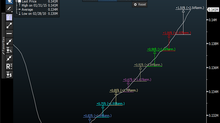The Fed Should Cut Now
Far be it from me, a small lone voice to weigh in on this, but others with BIG voices have been saying the same thing for some time: The hour has come where the Fed needs to cut rates. Not September. But now.
The American labor market has had a fantastic run, first, in terms of the recovery from the pandemic, and then the strong follow through afterwards. However, that momentum seems to have stalled.
U-3

U-6

Civilian Labor Force

I believe that Fed policy has done all it CAN do, and looking in the rear view mirror, it may not have been as effective as people believe. That's due mostly to the supply shock whiplash caused by the pandemic, (with the ability of merchants to exploit it for as long as possible) and the long lag in getting prices back to some kind of equilibrium. That's still going on, with supply normalizing and a belated consumer resistance to pricing, which is stronger than any tool the Fed has. Nothing drops prices faster than stale inventory.
The other aspect of the ineffective nature of rate policy is that many CPI components, like auto insurance or used car prices, aren't moved by rate policy. The constant fixation on headline CPI distorts everything, and consumer sentiment, as noted before, is more fixated on gasoline prices than almost anything else, despite the fact that it means so little in terms of a family's wallet share. Then there's the bias on shelter cost in CPI, so "aiming" for a "2% target" is a fool's errand.
There are second order effects to higher rates that are not only ineffective, but destructive. Rate policy is a blunt tool, but when confronted by the sense of urgency to cut rates now, Fed governors seem to believe they need more time to slay a dragon that may be already dead, and in the process, inflicting needless damage on many sectors of the economy.
Skate where the puck is going, not where it's been.
Why is this happening? My supposition, and that of many other observers, is that the ghosts of the 1970s still haunt them. For those who lived through this time, there were a few head fakes when the Federal Funds rate was relaxed after inflation subsided only to see inflation spike again. This is one of the most significant events in the history of monetary policy, so its no surprise policy makers are looking at the old models.
But for dozens of reasons, that paradigm may not be relevant today.
With labor market momentum slowing, food inflation at zero, and dozens of examples of price stabilization in place, if not disinflation altogether, there is nothing to be gained by waiting.
Judging from recent comments from Fed Governors, they seem to be more than willing to inflict some pain just to "make sure" things are where we want them. One can only hope they come around.















